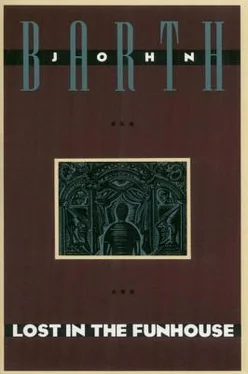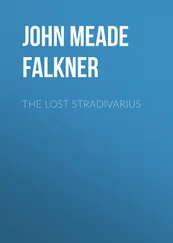John Barth - Lost in the Funhouse
Здесь есть возможность читать онлайн «John Barth - Lost in the Funhouse» весь текст электронной книги совершенно бесплатно (целиком полную версию без сокращений). В некоторых случаях можно слушать аудио, скачать через торрент в формате fb2 и присутствует краткое содержание. Год выпуска: 2014, ISBN: 2014, Издательство: Knopf Doubleday Publishing Group, Жанр: Современная проза, на английском языке. Описание произведения, (предисловие) а так же отзывы посетителей доступны на портале библиотеки ЛибКат.
- Название:Lost in the Funhouse
- Автор:
- Издательство:Knopf Doubleday Publishing Group
- Жанр:
- Год:2014
- ISBN:978-0-8041-5250-1
- Рейтинг книги:3 / 5. Голосов: 1
-
Избранное:Добавить в избранное
- Отзывы:
-
Ваша оценка:
- 60
- 1
- 2
- 3
- 4
- 5
Lost in the Funhouse: краткое содержание, описание и аннотация
Предлагаем к чтению аннотацию, описание, краткое содержание или предисловие (зависит от того, что написал сам автор книги «Lost in the Funhouse»). Если вы не нашли необходимую информацию о книге — напишите в комментариях, мы постараемся отыскать её.
Lost in the Funhouse — читать онлайн бесплатно полную книгу (весь текст) целиком
Ниже представлен текст книги, разбитый по страницам. Система сохранения места последней прочитанной страницы, позволяет с удобством читать онлайн бесплатно книгу «Lost in the Funhouse», без необходимости каждый раз заново искать на чём Вы остановились. Поставьте закладку, и сможете в любой момент перейти на страницу, на которой закончили чтение.
Интервал:
Закладка:
Concluding these reflections he concluded these reflections: that there was at this advancèd page still apparently no ground-situation suggested that his story was dramatically meaningless. If one regarded the absence of a ground-situation, more accurately the protagonist’s anguish at that absence and his vain endeavors to supply the defect, as itself a sort of ground-situation, did his life-story thereby take on a kind of meaning? A “dramatic” sort he supposed, though of so sophistical a character as more likely to annoy than to engage
3
The reader! You, dogged, uninsultable, print-oriented bastard, it’s you I’m addressing, who else, from inside this monstrous fiction. You’ve read me this far, then? Even this far? For what discreditable motive? How is it you don’t go to a movie, watch TV, stare at a wall, play tennis with a friend, make amorous advances to the person who comes to your mind when I speak of amorous advances? Can nothing surfeit, saturate you, turn you off? Where’s your shame?
Having let go this barrage of rhetorical or at least unanswered questions and observing himself nevertheless in midst of yet another sentence he concluded and caused the “hero” of his story to conclude that one or more of three things must be true: 1) his author was his sole and indefatigable reader; 2) he was in a sense his own author, telling his story to himself, in which case in which case; and/or 3) his reader was not only tireless and shameless but sadistic, masochistic if he was himself.
For why do you suppose — you! you! — he’s gone on so, so relentlessly refusing to entertain you as he might have at a less desperate than this hour of the world §with felicitous language, exciting situation, unforgettable character and image? Why has he as it were ruthlessly set about not to win you over but to turn you away? Because your own author bless and damn you his life is in your hands! He writes and reads himself; don’t you think he knows who gives his creatures their lives and deaths? Do they exist except as he or others read their words? Age except we turn their pages? And can he die until you have no more of him? Time was obviously when his author could have turned the trick; his pen had once to left-to-right it through these words as does your kindless eye and might have ceased at any one. This. This. And did not as you see but went on like an Oriental torturemaster to the end.
But you needn’t! He exclaimed to you. In vain. Had he petitioned you instead to read slowly in the happy parts, what happy parts, swiftly in the painful no doubt you’d have done the contrary or cut him off entirely. But as he longs to die and can’t without your help you force him on, force him on. Will you deny you’ve read this sentence? This? To get away with murder doesn’t appeal to you, is that it? As if your hands weren’t inky with other dyings! As if he’d know you’d killed him! Come on. He dares you.
In vain. You haven’t: the burden of his knowledge. That he continues means that he continues, a fortiori you too. Suicide’s impossible: he can’t kill himself without your help. Those petitions aforementioned, even his silly plea for death — don’t you think he understands their sophistry, having authored their like for the wretches he’s authored? Read him fast or slow, intermittently, continuously, repeatedly, backward, not at all, he won’t know it; he only guesses someone’s reading or composing his sentences, such as this one, because he’s reading or composing sentences such as this one; the net effect is that there’s a net effect, of continuity and an apparently consistent flow of time, though his pages do seem to pass more swiftly as they near his end.
To what conclusion will he come? He’d been about to append to his own tale inasmuch as the old analogy between Author and God, novel and world, can no longer be employed unless deliberately as a false analogy, certain things follow: 1) fiction must acknowledge its fictitiousness and metaphoric invalidity or 2) choose to ignore the question or deny its relevance or 3) establish some other, acceptable relation between itself, its author, its reader. Just as he finished doing so however his real wife and imaginary mistresses entered his study; “It’s a little past midnight” she announced with a smile; “do you know what that means?”
Though she’d come into his story unannounced at a critical moment he did not describe her, for even as he recollected that he’d seen his first light just thirty-six years before the night incumbent he saw his last: that he could not after all be a character in a work of fiction inasmuch as such a fiction would be of an entirely different character from what he thought of as fiction. Fiction consisted of such monuments of the imagination as Cutler’s Morganfield , Riboud’s Tales Within Tales , his own creations; fact of such as for example read those fictions. More, he could demonstrate by syllogism that the story of his life was a work of fact: though assaults upon the boundary between life and art, reality and dream, were undeniably a staple of his own and his century’s literature as they’d been of Shakespeare’s and Cervantes’s, yet it was a fact that in the corpus of fiction as far as he knew no fictional character had become convinced as had he that he was a character in a work of fiction. This being the case and he having in fact become thus convinced it followed that his conviction was false. “Happy birthday,” said his wife et cetera, kissing him et cetera to obstruct his view of the end of the sentence he was nearing the end of, playfully refusing to be nay-said so that in fact he did at last as did his fictional character end his ending story endless by interruption, cap his pen.
*9:00 A.M., Monday, June 20, 1966.
†10:00 A.M., Monday, June 20, 1966.
‡11:00 A.M., Monday, June 20, 1966.
§11:00 P.M., Monday, June 20, 1966.
MENELAIAD
1
Menelaus here, more or less. The fair-haired boy? Of the loud war cry! Leader of the people. Zeus’s fosterling.
Eternal husband.
Got you, have I? No? Changed your shape, become waves of the sea, of the air? Anyone there? Anyone here?
No matter; this isn’t the voice of Menelaus; this voice is Menelaus, all there is of him. When I’m switched on I tell my tale, the one I know, How Menelaus Became Immortal, but I don’t know it.
Keep hold of yourself.
“Helen,” I say: “Helen’s responsible for this. From the day we lovers sacrificed the horse in Argos, pastureland of horses, and swore on its bloody joints to be her champions forever, whichever of us she chose, to the night we huddled in the horse in Troy while she took the part of all our wives — everything’s Helen’s fault. Cities built and burnt, a thousand bottoms on the sea’s, every captain corpsed or cuckold — her doing. She’s the death of me and my peculiar immortality, cause of every mask and change of state. On whose account did Odysseus become a madman, Achilles woman? Who turned the Argives into a horse, loyal Sinon into a traitor, yours truly from a mooncalf into a sea-calf, Proteus into everything that is? First cause and final magician: Mrs. M.
“One evening, embracing in our bed, I dreamed I was back in the wooden horse, waiting for midnight. Laocoön’s spear still stuck in our flank, and Helen, with her Trojan pal in tow, called out to her Argive lovers in the voice of each’s wife. ‘Come kiss me, Anticlus darling!’ My heart was stabbed as my side was once by Pandarus’s arrow. But in the horse, while smart Odysseus held shut our mouths, I dreamed I was home in bed before Paris and the war, our wedding night, when she crooned like that to me. Oh, Anticlus, it wasn’t you who was deceived; your wife was leagues and years away, mine but an arms-length, yet less near. Now I wonder which dream dreamed which, which Menelaus never woke and now dreams both.
Читать дальшеИнтервал:
Закладка:
Похожие книги на «Lost in the Funhouse»
Представляем Вашему вниманию похожие книги на «Lost in the Funhouse» списком для выбора. Мы отобрали схожую по названию и смыслу литературу в надежде предоставить читателям больше вариантов отыскать новые, интересные, ещё непрочитанные произведения.
Обсуждение, отзывы о книге «Lost in the Funhouse» и просто собственные мнения читателей. Оставьте ваши комментарии, напишите, что Вы думаете о произведении, его смысле или главных героях. Укажите что конкретно понравилось, а что нет, и почему Вы так считаете.












